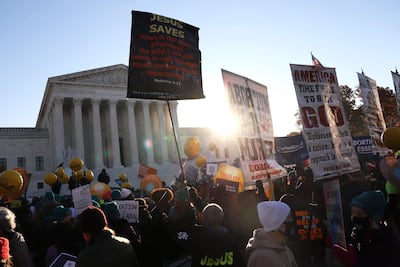Conservative US Supreme Court justices on Wednesday indicated support for curbing abortion rights in America by upholding a restrictive Mississippi law, as liberal justices warned against ditching important legal precedents like the 1973 Roe v Wade decision that legalised the procedure nationwide.
The court, which has a 6-3 conservative majority, heard oral arguments in the southern state's appeal to revive its ban on abortion starting at 15 weeks of pregnancy. Lower courts had blocked the Republican-backed law.
Jackson Women's Health Organisation, the only abortion clinic in Mississippi, challenged the law and has the support of Democratic President Joe Biden's administration. A ruling is expected by the end of next June.
The closely watched case brought hundreds of protesters from both sides of the issue to duelling rallies outside the Supreme Court.

Roe v Wade recognised that the right to personal privacy under the US Constitution protects a woman's ability to terminate her pregnancy. The Supreme Court in a 1992 ruling — Planned Parenthood of South-Eastern Pennsylvania v Casey — reaffirmed abortion rights and prohibited laws imposing an “undue burden” on abortion access.
The Roe and Casey decisions determined that states cannot ban abortion before a foetus is viable outside the womb, generally viewed by doctors as between 24 and 28 weeks.
“Why is 15 weeks not enough time” for a woman to decide to have an abortion, conservative Chief Justice John Roberts asked during the argument.
While Mr Roberts seemed to indicate that the court could uphold the Mississippi law without overturning Roe v Wade, some of his fellow conservatives, including Justice Neil Gorsuch, appeared to be interested in going further.
“The constitution is neither pro-life nor pro-choice … and leaves the issue to the people to resolve in the democratic process,” said conservative Justice Brett Kavanaugh.
Mr Kavanaugh wondered if the court should be neutral on abortion rights, which would require overturning Roe. If Mississippi wins the case, Mr Kavanaugh added, such a ruling would not prohibit abortion nationwide but would let states regulate it as they see fit.
Julie Rikelman, the lawyer arguing for the abortion clinic that challenged the Mississippi law, said overturning Roe would not mean the court is neutral as it would be saying that even though the constitution protects liberty, women “would never have equal status under the constitution".
“Allowing a state to take control of a woman's body … is a fundamental violation of her liberty,” Ms Rikelman said.
Liberal justices Stephen Breyer and Sonia Sotomayor spoke on the dangers of politicising the issue.
Bowing to political pressure and delivering such a ruling would “subvert the court's legitimacy”, Mr Breyer said.
“Will this institution survive the stench this creates?” Ms Sotomayor asked, saying that it would give the impression that the constitution and its interpretation is based purely on politics.
“If people think it is all political … how will the court survive?”
Anti-abortion advocates view the case as being one step closer to overturning Roe v Wade, a long-standing goal for Christian conservatives.
Encouraged by the high court's conservative-leaning majority, some notable Republicans were already expressing confidence.
“We are asking the court in no uncertain terms to make history,” former vice president Mike Pence said.
Mississippi's is one of a series of restrictive abortion laws passed in Republican-governed states in recent years. The Supreme Court on November 1 heard arguments on a Texas law banning abortion at about six weeks of pregnancy but has not yet issued a ruling.
Wednesday's arguments could provide insight into whether there are the needed five votes among the six conservative justices to overturn Roe v Wade.
Republican former president Donald Trump vowed when he ran for office in 2016 to nominate justices who would overturn the judicial decision.
Mr Trump followed through, appointing three conservative justices who transformed the court and made it easier to offer new challenges to abortion rights: Mr Gorsuch, Mr Kavanaugh and Amy Coney Barrett.
Supreme Court justices are given lifetime appointments and have the potential to shape US policy for a generation.
Agencies contributed to this report
